Working closely with our Ear, Nose and Throat (ENT) surgeons, Neurosensory provides world-class standards
in cochlear implant procedures.
Our caring staff will be there every step of the way to ensure your cochlear implant experience is positive and supported.






